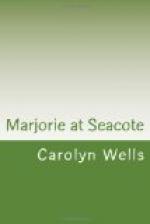“Then you may recite it, as your little schoolmates seem anxious to have you do so.”
So again, Mrs. Bryant diffidently made her bow, and recited, with real dramatic effect:
“AN UNVISITED LOCALITY
“I wisht I was as big
as men,
To see the Town of After Ten;
I’ve heard it is so
bright and gay,
It’s almost like another
day.
But to my bed I’m packed
off straight
When that old clock strikes
half-past eight!
It’s awful hard to be
a boy
And never know the sort of
joy
That grown-up people must
have when
They’re in the Town
of After Ten.
I’m sure I don’t
know what they do,
For shops are closed, and
churches too.
Perhaps with burglars they
go ’round,
And do not dare to make a
sound!
Well, soon I’ll be a
man, and then
I’ll see the Town of
After Ten!”
“Oh, Cousin Ethel, you’re lovely!” cried Marjorie, forgetting her role for the moment. But King took it up.
“Yes, little Ethel,” he said, “you recite very nicely, for such a young child. Now, go to your seat, and Helen Maynard may recite next.”
“Mine is a Natural History Poem,” said Mrs. Maynard, coming up to the teacher’s desk. “It is founded on fact, and it is highly instructive.”
“That’s nice,” said King. “Go ahead with it.”
So Mrs. Maynard made her bow and though not bashful, like Mrs. Bryant, she was very funny, for she pretended to forget her lines, and stammered and hesitated, and finally burst into pretended tears. But, urged on and encouraged by the teachers, she finally concluded this gem of poesy:
“THE WHISTLING WHALE
“A whistling whale once
built his nest
On the very tiptop of a mountain’s
crest.
He wore a tunic and a blue
cocked hat,
And for fear of mice he kept
a cat.
The whistling whale had a
good-sized mouth,
It measured three feet from
north to south;
But when he whistled he puckered
it up
Till it was as small as a
coffee-cup.
The people came from far and
near
This wonderful whistling whale
to hear;
And in a most obliging way
He stood on his tail and whistled
all day.”
“That’s a truly noble poem,” commented King, as she finished. “Take your seat, Helen; you have done splendidly, my little girl!”
“Now, Teddy Maynard, it’s your turn,” said Marjorie.
“After Jacky,” declared Mr. Maynard, and nothing would induce him to precede his friend.
“Mine is about a visit I paid to the Zoo,” said Mr. Bryant, looking modest. “I wrote it myself for a composition, but it turned out to be poetry. I never can tell how my compositions are going to turn out.”
“Recite it,” said Marjorie, “and we’ll see if we like it.”
“It’s about wild animals,” went on Cousin Jack, “and it tells of their habits.”




